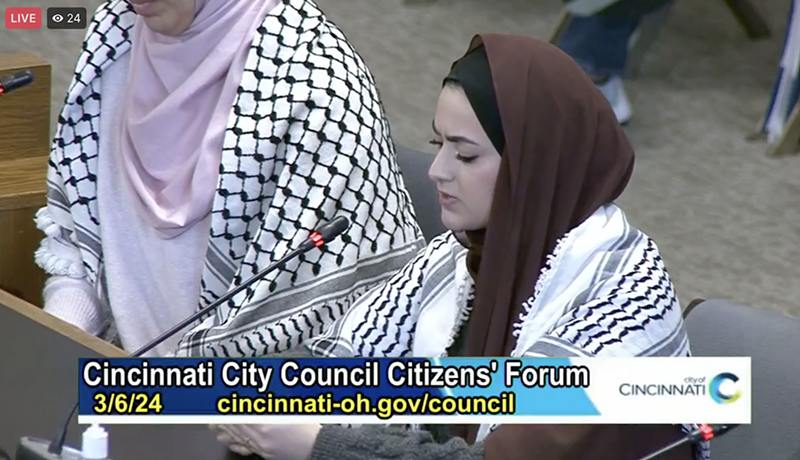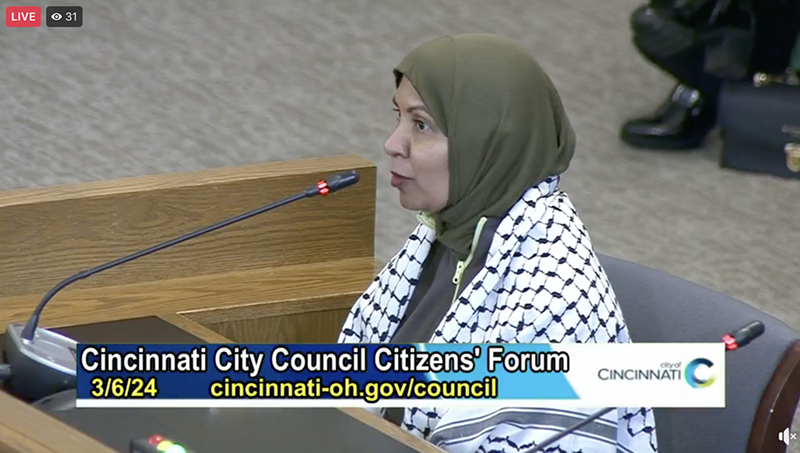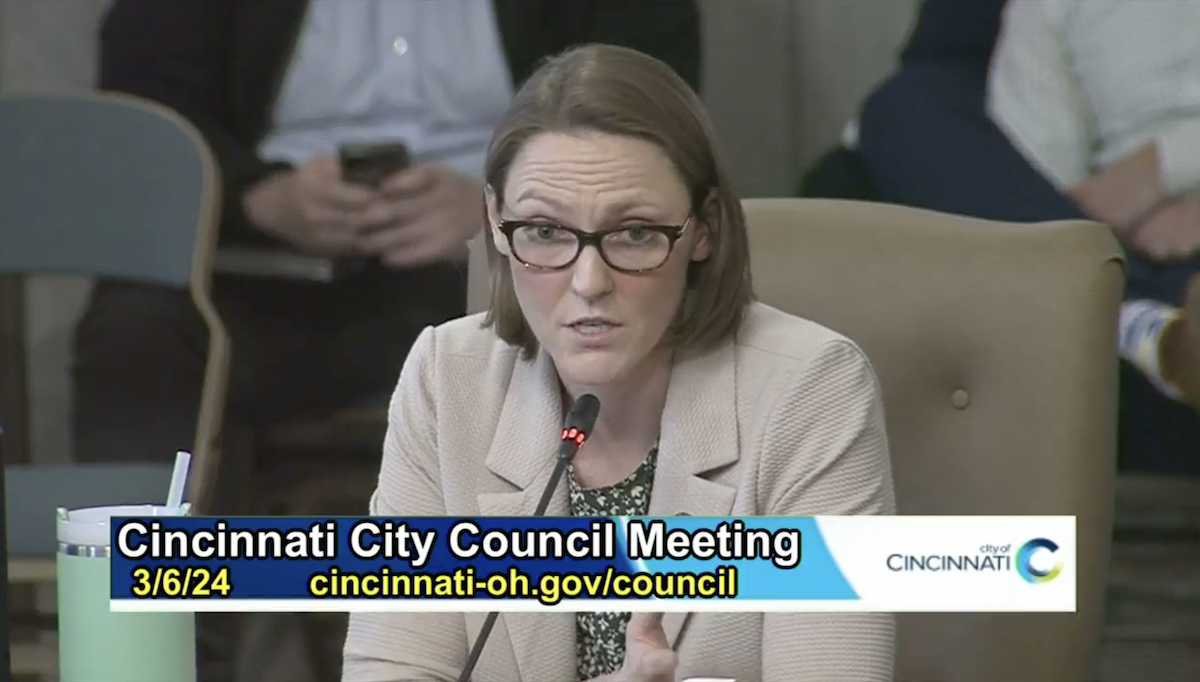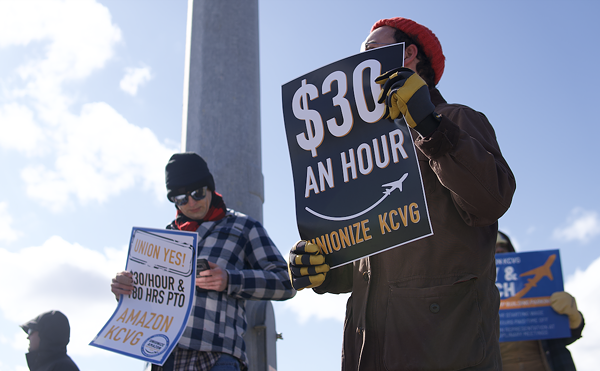Cincinnati City Council returned to a discussion of a Middle East ceasefire resolution this week, but the all-Democratic body remains divided.
For months, hundreds of people have addressed council during the public comment portion of the weekly meetings. Most are Cincinnatians imploring council to pass a resolution that calls for an immediate humanitarian ceasefire, others have encouraged council to abstain from engaging in the conversation altogether.
On March 6, a resolution calling for a six-week ceasefire from council newcomer Anna Albi passed 7-1, while a resolution calling for a permanent ceasefire from council member Meeka Owens failed 4-3, needing 5 to pass.
The evolution of how council went from no ceasefire resolutions to two started in February when Owens spoke out in support of a possible resolution.
Where council was on the matter in February
Council has voted to condemn acts of war and violence before, including passing a resolution that condemned Russia for invading Ukraine, as well as a resolution condemning Hamas' Oct. 7 terror attack that left upwards of 1,200 Israeli citizens dead. But only one member of council has expressed interest in a ceasefire resolution since Israel began its deadly counteroffensive in Gaza. Council Member Owens expressed her desire to put forth a ceasefire resolution in a tearful speech during a Feb. 7 council meeting, saying council was “not elected to be silent,” while council members Mark Jeffreys, Reggie Harris and Seth Walsh signed a joint statement declining to sponsor any ceasefire resolution.
That all changed when Albi put forth a ceasefire resolution for the March 6 meeting, one that Jeffreys, Harris, Walsh and Victoria Parks co-sponsored. Mayor Aftab Pureval placed Albi’s resolution on the agenda alongside Owens’ resolution, and guest speakers were quick to point out their differences.
How the two resolutions differ
Both Owens’ and Albi’s resolutions address the ongoing death toll in Gaza, but make different calls to action.
Council Member Owens’ resolution mirrors the comments she made during the Feb. 7 meeting.
It reads: "Expressing the request of the council of the city of Cincinnati for a humanitarian ceasefire in the Israel/Hamas War so that humanitarian aid can reach Gazans, Israeli hostages can be released, and additional innocent lives can be spared."
Read Owens' full resolution here:
Read Owens' full resolution here:
Councilmember Albi’s resolution broadly condemns “violence against civilians of any kind” and supports negotiations taking place in Cairo, advocating for a deal that would include a six-week ceasefire.
It reads: "Expressing Cincinnati City Council's sympathy for the ongoing human suffering caused by the current conflict in the Middle East; condemning violence against civilians of any kind; affirming Cincinnati's status as a welcoming community for those of the Jewish and Islamic religions, and all other religions; supporting the right of Palestinian and Israeli civilians to live in safety and peace; and encouraging Cincinnati residents to offer support and sincere empathy to members of our community affected by the ongoing violence and loss of life."
Read Albi's full resolution here:
As of press time, around 30,000 people have been killed in Gaza as Israel continues its counteroffensive measures against Hamas, according to the Hamas-run Gaza Health Ministry.
Read Albi's full resolution here:
As of press time, around 30,000 people have been killed in Gaza as Israel continues its counteroffensive measures against Hamas, according to the Hamas-run Gaza Health Ministry.
Public comments
Criticism was repeatedly lodged against Albi and her resolution’s co-sponsors during the public comment portion of the meeting. While Owens’ resolution calls for an immediate humanitarian ceasefire, speakers were quick to point out that Albi’s resolution only offers support for negotiations currently taking place for a six-week ceasefire.
“This Council supports negotiators in Cairo advocating for a deal that would include a six-week cease-fire, the release of vulnerable hostages, and the provision of unrestricted humanitarian aid; and encourages our federal government leadership to continue working for lasting and permanent peace in the region,” reads Albi’s resolution.
One speaker told council a six-week ceasefire is not enough for her family living in the West Bank.
“A six-week ceasefire is not enough, nor has Israel ever felt bound to them,” said the speaker.

Photo: CitiCable
A guest speaker tells Cincinnati City Council that a temporary ceasefire resolution is "not enough" during a March 6 meeting.
Senior administration officials for President Joe Biden told reporters on March 2 that Israeli leaders have “basically accepted” a six-week ceasefire proposal, but that they are still waiting on approval from Hamas. But Hamas officials told reporters on March 5 that talks will resume sometime next week, according to the Associated Press.
Rabbi Ari Jun, director of the Jewish Community Relations Council for the Jewish Federation of Cincinnati, addressed council to urge against a ceasefire resolution on Feb. 7, saying council was being asked to make “an impossible decision to either support or condemn a distant war that has fundamentally divided our community." Jun returned to council on March 6, telling CityBeat that Albi’s resolution represents a compromise.
“The resolution that Anna Albi put forward, while it's not exactly what every member of the Jewish community would ask for, represents a compromise,” Jun told CityBeat. “We have always, of course, held the dream and the goal that there would be peace and that this conflict would come to an end, but at the same time, it's not council's job to engage in foreign affairs when all it will do is divide our community.”
Why does this matter in Cincinnati?
While council’s most recent meeting would make it appear otherwise, Cincinnati’s elected leaders have no control over the negotiations taking place for peace in the Middle East. Still, one guest speaker told council that their messaging on the topic sends a signal to the community about safety and peace.
“As representatives of our beloved city, you have a responsibility, not only to your constituents, but to humanity at large,” she said. “By passing [Ownes’] resolution, we not only send a message of solidarity to the people of Gaza, but we would also affirm our own city’s commitment to principles of human rights and dignity for all. We would be joining a growing chorus of voices calling for an end to violence.”

Photo: CitiCable
A guest speaker tells Cincinnati City Council that passing a permanent ceasefire resolution would "affirm our own city’s commitment to principles of human rights" during a March 6 meeting.
At least 67 U.S. cities have passed symbolic resolutions calling for a ceasefire in Gaza, including Chicago, Detroit, Seattle, Atlanta, Minneapolis and others. City leaders in Toledo, Dayton and Akron have all unanimously passed ceasefire resolutions, but city councils for Columbus and Cleveland have both voted against similar resolutions.
In Cleveland, pro-Palestinian advocates reacted to their city council’s rejection of a ceasefire resolution by passing a “People’s Resolution” instead.
Collective action to send Biden officials the ceasefire message even crept into Super Tuesday voting. Hundreds of thousands of voters across the country cast a ballot for no candidate or different versions of “uncommitted” during the March 5 Democratic primaries. The movement came just a week after 100,000 Michigan voters selected “uncommitted” to send a message to Biden over his handling of the situation in Gaza.
How exactly did council members vote?
Before voting, Albi addressed the gallery that spent hours calling her out by name, saying, “The atrocities of this conflict are truly incomprehensible. What we’ve heard from our Greater Cincinnati community is the resounding desire for peace and the end to this war.”
Albi goes on to say that council has no power over the conflict in the Middle East, but that council has the opportunity to show its support for the ceasefire negotiations currently underway.
“While none of us in this room have the power to shape the details of this ceasefire, I think it is important for us to show our full support of these peace negotiations,” Albi said. “I understand these negotiations are just the first step − and we should all hope and pray that Israel and Hamas will be able to find common ground for a permanent and lasting peace.”
Some members of the gallery responded to Albi’s remarks with boos and shouts of “Shame!” before Mayor Pureval asked for order.
Members of council, who are all Democrats, voted on both resolutions as follows:
- YES votes on Albi's resolution: Albi, Owens, Walsh, Jeffreys, Parks, Harris and Jan-Michele Lemon Kearney.
- NO votes on Albi's resolution: Scotty Johnson
- YES votes on Owens' resolution: Owens, Kearney, Johnson and Parks
- NO votes on Owens' resolution: Walsh, Jeffreys and Harris.
Albi abstained from voting on Owens’ resolution.
Councilman Jeff Cramerding abstained from voting on both resolutions, saying he now regrets voting for resolutions regarding foreign affairs in the past.
“I will accept any criticism for those votes, but moving forward I will no longer vote for any international resolutions unless it directly pertains to Cincinnati city government,” Cramerding said.
Johnson, who didn’t speak up on the issue during the Feb. 7 meeting, spoke forcefully in favor of Owens’ resolution.
“I stand wholeheartedly, flat-footed behind the call for a permanent ceasefire,” Johnson said to cheers from the gallery. “I’m an honest man and I don’t understand everything that’s going on, but I do know that peace has to reign.”







